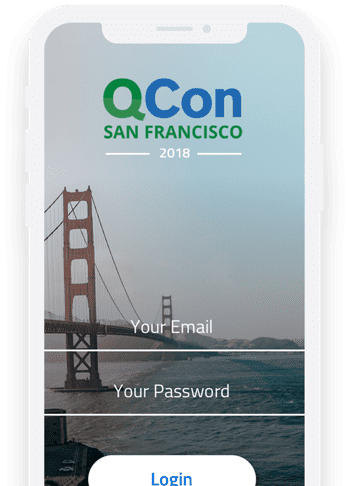Industry practitioners and technical product managers from leading vendors demonstrate solutions to some of today's toughest software development challenges in the areas of performance monitoring, Big Data, software delivery, scalability, and more.
Track: Sponsored Solutions Track II
Location: Marina
Day of week: Monday

Track Host: Nitin Bharti
Nitin has helped build several notable online developer communities including TheServerSide.com, DZone, and The Code Project. He is known for his extensive editorial work in the Enterprise Java, .NET, SOA, and Agile communities. As Managing Editor and Product Manager at C4Media - the producer of InfoQ.com and QCon events - Nitin continues to pursue his primary passion: helping spread knowledge and innovation throughout the enterprise software development community.
10:35am - 11:25am
NoSQL + SQL = MySQL
With the official release of version 8.0, MySQL is the only database to offer both SQL and NoSQL data access – delivering the best of both worlds to Developers, DevOps, and DBA teams alike. This presentation guides you through the basics of the MySQL Document Store and how to use the X DevAPI in MySQL Connector/Node.js 8.0 to manage document collections and use CRUD methods to work with documents in MySQL.
11:50am - 12:40pm
Create a Fair & transparent AI Pipeline with AI Fairness 360
One of the most critical and controversial topics around artificial intelligence centers around bias. As more apps come to market that rely on artificial intelligence, software developers and data scientists can unwittingly (or perhaps even knowingly) inject their personal biases into these solutions.
Because flaws and biases may not be easy to detect without the right tool, we have launched AI Fairness 360, an open source library to help detect and remove bias in machine learning models and data sets.
The AI Fairness 360 Python package includes a comprehensive set of metrics for data sets and models to test for biases, explanations for these metrics, and algorithms to mitigate bias in data sets and models. The research community worked together to create 30 fairness metrics and nine state-of-the-art bias mitigation algorithms.
We will share lessons learned while using AI Fairness 360 and demonstrate how to leverage it to detect and de bias models during pre-processing, in-processing, and post-processing. We will explain how to take these practices and apply them on training in on a more robust environment using Fabric for Deep Learning (FfDL, pronounced “fiddle”) which provides a consistent way to run various scalable deep learning frameworks as a service on Kubernetes.
Christian Kadner, Software developer @IBM, committer to Apache Bahir and contributor to Jupyter Enterprise Gateway
1:40pm - 2:30pm
Fullstack Graph Applications With Neo4j
What do graph databases, GraphQL, geospatial data, and data science with graph algorithms have in common? The graph datamodel! Learn how to build a fullstack application using Neo4j leveraging these technologies.
We'll cover all the pieces and show how they fit together, starting with an overview of graph databases, the property graph datamodel, the Cypher query language, and client drivers for building a web app.
Then we'll extend our application to show how to model and query data from OpenStreetMap for point of interest detection, efficient routing, and generate real-time recommendations using graph algorithms and analytics. Finally, we'll show how to wrap all this functionality into a GraphQL API for our frontend React map-based application to work with.
No experience with Neo4j or graph databases is necessary to benefit from this talk, but hopefully, afterwards you'll have some ideas of how you can apply these technologies to your applications.
2:55pm - 3:45pm
Efficient and Sustainable Unit Testing
"I hate unit testing!" Many developers feel this way, but why? We know we should write unit tests, but many of our codebases are not well tested due to the complexity and time it takes to write and maintain the tests. But there is good news – modern technologies and testing practices can make unit testing more efficient, palatable, and sustainable! In this session, Nathan will use real-world examples to describe how development teams can make unit testing work.
Topics include: Tooling that can generate portions of the unit test code, along with configuration of mocks, to make creating the tests easier and more efficient.
How to identify and run just the tests that are impacted by code changes within the IDE before code is committed to source control, and how to configure pull request workflows and CI test runs to only run the tests impacted by the code changes since the last full build, for cases where running all the unit tests takes too much time.
How to augment the unit test practice by collecting code coverage metrics from automated functional and UI test jobs, to increase coverage in areas of the code that are difficult to cover by unit tests.
4:10pm - 5:00pm
Move Fast, Follow Everything & Focus on What Matters Most
AppDynamics automatically monitors every business transaction and directly understands the impact it’s having on your users and business in real time to deliver contextual, actionable, and unifying intelligence, allowing you to focus on what’s happening on the front lines - where the app and business converge and where customers can be won or lost every moment.
5:25pm - 6:15pm
Modern Authentication Demystified
From web applications to APIs, desktop to mobile apps, and everything in between there has never been a better or more complex time to write code. When it comes to securing the various types of applications you may be wondering what the right approach is. It may seem that with each new architecture, the rules of security get rewritten. JSON Web Tokens, Open ID, Authentication Flows, Oh My! In this talk, we'll look at and demystify common security patterns for various types of modern app architectures.
Tracks
Monday, 5 November
-
Microservices / Serverless Patterns & Practices
Evolving, observing, persisting, and building modern microservices
-
Practices of DevOps & Lean Thinking
Practical approaches using DevOps & Lean Thinking
-
JavaScript & Web Tech
Beyond JavaScript in the Browser. Exploring WebAssembly, Electron, & Modern Frameworks
-
Modern CS in the Real World
Thoughts pushing software forward, including consensus, CRDT's, formal methods, & probabilistic programming
-
Modern Operating Systems
Applied, practical, & real-world deep-dive into industry adoption of OS, containers and virtualization, including Linux on Windows, LinuxKit, and Unikernels
-
Optimizing You: Human Skills for Individuals
Better teams start with a better self. Learn practical skills for IC
Tuesday, 6 November
-
Architectures You've Always Wondered About
Next-gen architectures from the most admired companies in software, such as Netflix, Google, Facebook, Twitter, & more
-
21st Century Languages
Lessons learned from languages like Rust, Go-lang, Swift, Kotlin, and more.
-
Emerging Trends in Data Engineering
Showcasing DataEng tech and highlighting the strengths of each in real-world applications.
-
Bare Knuckle Performance
Killing latency and getting the most out of your hardware
-
Socially Conscious Software
Building socially responsible software that protects users privacy & safety
-
Delivering on the Promise of Containers
Runtime containers, libraries, and services that power microservices
Wednesday, 7 November
-
Applied AI & Machine Learning
Applied machine learning lessons for SWEs, including tech around TensorFlow, TPUs, Keras, PyTorch, & more
-
Production Readiness: Building Resilient Systems
More than just building software, building deployable production ready software
-
Developer Experience: Level up your Engineering Effectiveness
Improving the end to end developer experience - design, dev, test, deploy, operate/understand.
-
Security: Lessons Attacking & Defending
Security from the defender's AND the attacker's point of view
-
Future of Human Computer Interaction
IoT, voice, mobile: Interfaces pushing the boundary of what we consider to be the interface
-
Enterprise Languages
Workhorse languages found in modern enterprises. Expect Java, .NET, & Node in this track


